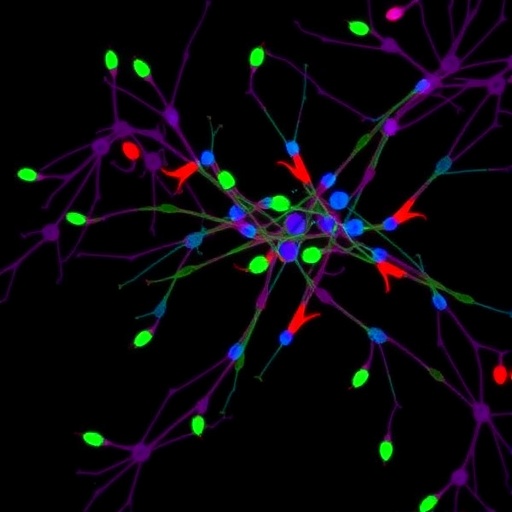Recent advancements in the realm of immunology have shed new light on the role of ubiquitination in autoimmune disorders, specifically focusing on the Th17 cell-mediated responses. A recent study led by Zeng, Guo, Tang, and their colleagues underscores the significance of K27-linked ubiquitination of RORγt by the Nedd4 ubiquitin ligase, a process that appears to potentiate Th17-mediated autoimmunity. This important finding opens new avenues for research into targeted therapies that could mitigate the effects of autoimmune diseases driven by Th17 cells.
RORγt, or retinoic acid-related orphan receptor gamma-t, is a critical transcription factor primarily expressed in Th17 cells. It plays an instrumental role in the differentiation, proliferation, and maintenance of these inflammatory T helper cells, which are pivotal in orchestrating immune responses against various pathogens. However, the dysregulation of Th17 responses is increasingly implicated in several autoimmune disorders, contributing to inflammation and tissue damage. Understanding the molecular mechanisms that regulate RORγt activity is crucial for developing novel therapeutic strategies targeting these pathways.
The study’s investigation into K27-linked ubiquitination represents a cutting-edge exploration into the post-translational modifications that dictate protein function and stability. Ubiquitination is a cellular mechanism through which proteins are tagged for degradation or activity regulation. The specific type of ubiquitination, linked through lysine 27 (K27), has been relatively understudied compared to other forms; however, its importance in cellular contexts is rapidly emerging. This research illuminates how K27-linked ubiquitination can enhance RORγt activity, leading to exacerbated Th17 cell responses.
Nedd4, the E3 ubiquitin ligase implicated in this study, is known for its role in regulating protein degradation and cellular functions through ubiquitination. The novel finding that Nedd4 facilitates K27-linked ubiquitination of RORγt adds a significant layer of understanding to how immune responses are fine-tuned at the molecular level. By covalently attaching ubiquitin moieties, Nedd4 could potentially strengthen the transcriptional activities of RORγt, resulting in heightened Th17 responses. This mechanistic insight presents a therapeutic target for overcoming unchecked inflammation in autoimmune diseases.
The research utilized various experimental techniques, including co-immunoprecipitation and mass spectrometry, to elucidate the interactions between Nedd4 and RORγt. Through these methods, the researchers demonstrated that the interaction between these proteins is not merely correlative but causal, ultimately leading to enhanced transcription of pro-inflammatory cytokines characteristic of Th17 cells. These findings prompt us to reconsider the importance of ubiquitin pathways in the context of immune regulation and the development of autoimmune conditions.
Moreover, the implications of this study extend beyond mere academic curiosity; they bear immediate relevance for clinical research and potential therapeutic interventions. If K27-linked ubiquitination can be leveraged to optimize or inhibit Th17 activity, it would serve as a novel therapeutic angle in treating autoimmune diseases such as rheumatoid arthritis, psoriasis, and multiple sclerosis. By targeting the specific enzymes involved in this regulatory mechanism, we may develop drugs that can more effectively restore balance in immune responses without broadly suppressing the immune system.
The intricate dance between immune pathways is a tapestry woven over eons of evolution, yet understanding the fine details of this system can unlock new possibilities for treating diseases that arise from its misregulation. As more researchers delve into the nuances of ubiquitination and its impact on T cell function, we can anticipate exciting developments that may radically alter how we understand and treat autoimmune conditions.
It is also essential to recognize the potentially wide-ranging impact of these findings on our understanding of not only autoimmune diseases but also other conditions characterized by aberrant immune responses. For example, the regulatory mechanisms uncovered in this study may also have implications for cancer immunology, particularly in how tumors manipulate immune pathways to evade detection and destruction by the host immune system. In many cancers, immune evasion is driven by T cells, making it imperative that we grasp the intricacies of the pathways involved.
Zeng et al.’s work is a prime example of how basic research can translate into meaningful clinical applications. Their meticulous approach presents compelling evidence that K27-linked ubiquitination is a critical modulator of immune responses, particularly in Th17-driven autoimmunity. As the scientific community continues to explore this pathway, we may witness not only a deeper understanding of the molecular players involved but also a revolution in therapeutic strategies that target these processes.
As researchers continue to investigate and validate these findings, collaboration across different fields will be vital. Immunologists, molecular biologists, and pharmacologists must work in concert to navigate the complex landscape of immune response manipulation. Only through such interdisciplinary efforts can we hope to translate laboratory insights into effective treatment options that will benefit patients grappling with autoimmune diseases.
In conclusion, the work of Zeng, Guo, Tang et al. points to a promising future in autoimmune disease therapy. By elucidating the role of K27-linked ubiquitination in Th17 cell biology, they have illuminated a path forward that could lead to innovative strategies for managing inflammation and autoimmunity. As we stand on the precipice of potentially transformative discoveries, the lessons learned from this research will undoubtedly inspire future investigations aimed at understanding the complexities inherent in our immune systems.
The journey from basic scientific inquiry to clinical application is often fraught with challenges, yet the insights garnered from this study are a powerful reminder that we are on the right path. With continued research and development, we can harness this newfound knowledge to revolutionize treatment options for patients affected by autoimmune disorders and beyond, ultimately leading to enhanced health outcomes and improved quality of life for countless individuals.
Subject of Research: The role of K27-linked RORγt ubiquitination by Nedd4 in Th17-mediated autoimmunity.
Article Title: Correction: K27-linked RORγt ubiquitination by Nedd4 potentiates Th17-mediated autoimmunity.
Article References:
Zeng, Q., Guo, H., Tang, N. et al. Correction: K27-linked RORγt ubiquitination by Nedd4 potentiates Th17-mediated autoimmunity. J Biomed Sci 32, 42 (2025). https://doi.org/10.1186/s12929-025-01136-8
Image Credits: AI Generated
DOI: 10.1186/s12929-025-01136-8
Keywords: RORγt, Th17 cells, autoimmune diseases, ubiquitination, Nedd4, immunology, K27-linked ubiquitination, inflammation.




